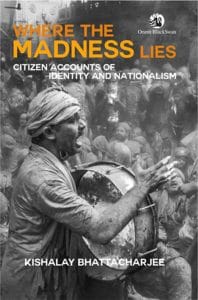One cannot help wonder whether the number of “China books” is a lagging or leading indicator of the country’s importance in world affairs. While some of these books communicate more about the author than China, Jeremy Garlick’s Advantage China: Agent of Change in an Era of Global Disruption is more realpolitik than politics, more about what works and what doesn’t than who’s right or wrong.
Current affairs
How do we talk about China? It’s a question every analyst, academic, policymaker, and reporter probably needs to ask themselves.
In Kerry Brown’s several decades of working in and observing China, he has developed a reputation as one of the more sober and thoughtful observers of the country. For those who value logic and epistemology over rhetoric, Brown’s latest (brief) book won’t disappoint.
Negotiating Borders and Borderlands, edited by Gorky Chakraborty and Supurna Banerjee, delves into the intricate dynamics of India’s borders and the everyday experiences of those living in its borderlands. It features a diverse collection of articles contributed by various authors, aiming to analyze and portray how borders have influenced the destiny of countries and their inhabitants.

Is environmental degradation an inevitable result of economic development? Can ecosystems be restored once government officials and the public are committed to doing so? These questions are at the heart of An Ecological History of Modern China, a comprehensive account of China’s transformation since the founding of the People’s Republic from the perspective not of the economy but of the biophysical world. Examples throughout illustrate how agricultural, industrial, and urban development have affected the resilience of China’s ecosystems—their ability to withstand disturbances and additional growth—and what this means for the country’s future.
In mid-April, Myanmar’s military bombed a village in the country’s northwest, killing over a hundred people in what’s been considered the deadliest attack in the now two-year civil war in the country: The result of the Myanmar military’s coup in February 2021.
The Rohingya population, from Myanmar’s Rakhine State, are a community almost living entirely in exile, whether in refugee camps in Bangladesh, or working on boats throughout the Indian Ocean. The Kutupalong refugee camp in Cox’s Bazar, Bangladesh, is now the world’s largest.

The idea of citizenship today conveys a static dullness, a clerical certification, and a fixed sense of identity. By re-examining the relationship between citizenship and nationality, Where the Madness Lies redefines the multiple sources of identity that ordinary people contend with. Citizenship becomes a critical theatre where diverse identities crisscross to create new forms of meaning and interaction.
The Myanmar coup on February 1, 2021 shocked the world, and ended an opening that had fostered hopes for democratization and economic development. The Tatmadaw, Myanmar’s military, reversed a decade’s worth of changes, and sparked a civil conflict that has continued for two years since the coup.
In this remarkable debut, Kaamil Ahmed tells the story of the displacement of the Rohingya from their home in Myanmar’s western Rakhine state and their ongoing search for refuge. This is not a new story, but Ahmed puts the spotlight firmly on the Rohingya perspective and allows them to tell their own story in their own words. The book is an impressive mix of history, political analysis and extensive reportage from Myanmar, Bangladesh and Malaysia.

You must be logged in to post a comment.